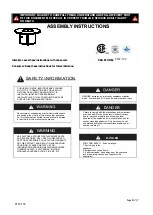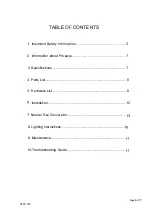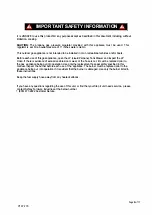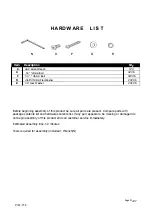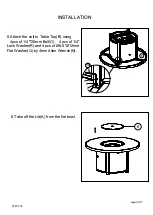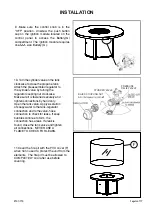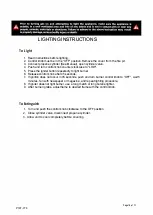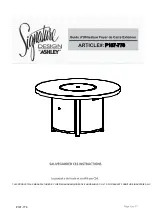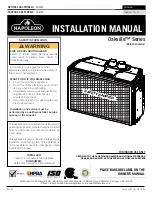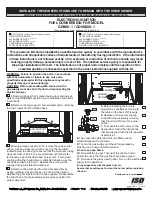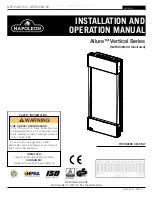
丛
bSAFETY|NFORMATION
I
A
DANGER
EXPLOSION-FIRE HAZARD
Keep solid combustibles, such as building materials,
paper of cardboard, a safe distance away from the
fire pit as recommended by the instructions.
Provide adequate clearances around air openings
into the combustion chamber.
Never use the fire pit in spaces which do or may
contain volatile or airborne combustibles, or products
such as gasoline, solvents, paint thinne
「
,dust particles
or unknown chemicals.
During operation, this product can be a source of
ignition. Keep fire pit area clear and free from
combustible materials, gasoline, paint thinner, cleaning
solvents and other flammable vapors and liquids. DO
not use fire pit in areas with high dust content.
Minimum fire pit clearances from combustible
materials: two (2) feet from the sides &two (2)
feet f
「
om the rear, 6 feet from ceiling.
I
A
DANGER
EXPLOSION - FIRE HAZARD
Never store propane near high heat, open flames,
pilot lights, direct sunlight, other ignition sources or
where temperatures exceed 120 degrees F (49
°
C).
Propane vapors are heavier than air and can
accumulate in low places. If you smell gas, leave the
area immediately.
Never install or remove propane cylinder while fire pit is
lighted, near flame, pilot lights, other ignition sources
o r while fire pit is hot to touch.
The fire pit is red hot during use and can ignite
flammables too close to the bumer. Keep flammables
at least 2 feet from sides & 2 feet from rea
「
,6feet
from ceiling. Keep gasoline and other flammable liquids
and vapors well away from fire pit.
Store the propane cylinder outdoors in a well ventilated
space out of reach of children. Never store the propane
cyli_nder_ in an en?l_os�d are� (house,. g�rage, etc.). If fire
pit is to be stored indoors, disconnect the propane
cylinder for outdoor storage.
A
WARNING
|
We cannot foresee every use which may be made of
our fire pit.
Check with your local fire safety authority if you have
questions about fire pit use.
Other standards govern the use of fuel gases and heat
producing products for specific uses. Your local
authorities can advise you about these.
If no local codes exist, follow National Fuel Gas Code,
ANSI 2223. 1. In Canada, installation must conform to
local codes. If no local codes exist, follow the current
National standards of CANADA CAN/CGA-B 149.2.
A
DANGER
|
CARBON MONOXIDE HAZARD
This fire pit is a combustion appliance. All combustion
appliances produce carbon monoxide (CO) during the
combustion process. This product is designed to produce
extremely minute, non-hazardous amounts of CO if used
and maintained in accordance with all warnings and
instructions. DO not block air flow into or out of the fire pit.
Carbon monoxide (CO) poisoning produces flu-like
symptoms, watery eyes, headaches, dizziness, fatigue
and possibly death. You can't see it and you can't
smell it. It's an invisible killer. If these symptoms are
present during operation of this product get fresh air
immediately!
For outdoo
「
use only.
Never use inside house, or other unventilated or
enclosed areas.
This fire pit consumes air (oxygen). Do not use in
unventilated or enclosed areas to avoid endangering
your life.
Do not store or use gasoline or other flammable vapors
and liquids in the vicinity of this or any other appliance.
An LP-cylinder not connected for use shall not be
stored in the vicinity of this or any other appliance.
|
A
WARNING: ForOutdoorUseOnly|
AoANGER
CARBON MONOXIDE HAZARD
This appliance can produce
@
carbon monoxide which has
no odor. Using it in an enclosed
space can kill you. Never use this
appliance in an enclosed space
such as a camper, tent, car or home.
Improper installation, adjustment alteration, service or
maintenance can cause property damage, injury or
death. Read the installation, operating and
maintenance instructions thoroughly before installing
or servicing this equipment.
Page 3of17
P187-776


